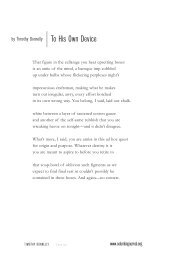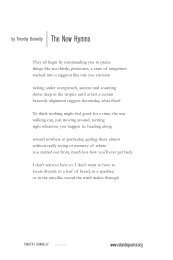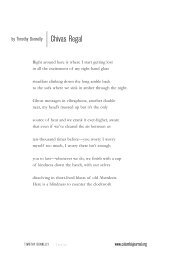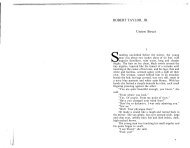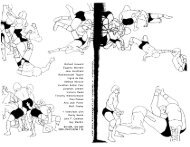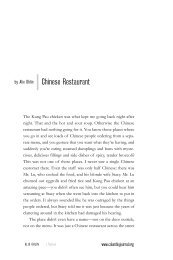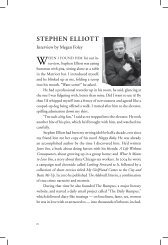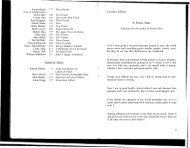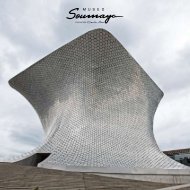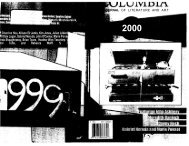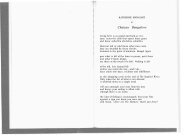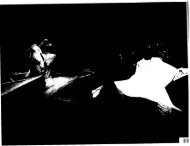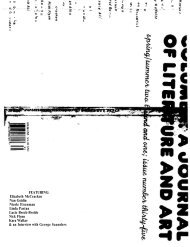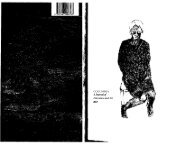Issue 27 - Columbia: A Journal of Literature and Art
Issue 27 - Columbia: A Journal of Literature and Art
Issue 27 - Columbia: A Journal of Literature and Art
You also want an ePaper? Increase the reach of your titles
YUMPU automatically turns print PDFs into web optimized ePapers that Google loves.
122<br />
TOM PERROTTA<br />
Bumping Into Klaus:<br />
A Cold War Encounter<br />
ON THE FIRST DAY <strong>of</strong> August in 1982, after two weeks <strong>of</strong> sightseeing<br />
in Western Europe—I was a college kid visiting on a summer<br />
traveling fellowship—I said good-bye to my traveling companion<br />
<strong>and</strong> boarded the night train from Frankfurt to West Berlin,<br />
which passed through mostly East German territory <strong>and</strong> was<br />
operated by East German personnel.<br />
This journey, my first muffled contact with the Communist<br />
world, was physically miserable <strong>and</strong> tinged with a vague sense <strong>of</strong><br />
menace. The train seemed to have been designed with the maximum<br />
discomfort <strong>of</strong> its riders in mind. The seats were hard wooden<br />
benches with only a tantalizing hint <strong>of</strong> padding, spaced so far apart<br />
in the compartment that you couldn't stretch out your legs <strong>and</strong><br />
rest them on the seat in front <strong>of</strong> you, the way you could on cushy<br />
capitalist trains.<br />
To make matters worse, I was the fifth <strong>and</strong> final passenger to<br />
arrive at my assigned compartment. My fellow passengers had<br />
already staked out the corner seats, leaving me to fend for myself<br />
in the No Man's L<strong>and</strong> in the middle <strong>of</strong> the bench, an ill-defined<br />
space without armrests. A headrest was bolted into the wall a full<br />
six inches above the top <strong>of</strong> my head.<br />
A couple <strong>of</strong> hours into the journey, when I had finally managed<br />
to close my eyes arid drift <strong>of</strong>f into a state close enough to<br />
sleep to be merciful, a soldier burst into our compartment <strong>and</strong><br />
dem<strong>and</strong>ed to see our papers. He was young, this soldier, with<br />
apple-red cheeks <strong>and</strong> a short-barreled assault weapon slung across<br />
his chest. I remembered faces like his from Triumph <strong>of</strong> the Will.<br />
As the sole American in the compartment, I seemed to merit<br />
extra scrutiny. The soldier scowled at my face <strong>and</strong> passport photo<br />
with a ferocious diligence I found flattering, ridiculous, <strong>and</strong> threatening<br />
all at once. Exhausted as I was, I sat up straight on the bench<br />
<strong>and</strong> scowled right back at him, striking what I thought to be a<br />
small blow for freedom.<br />
II.<br />
Ten days later I paid my first visit to East Berlin. By that point<br />
I'd fallen into a mild depression. My trip wasn't working out as<br />
I'd hoped.<br />
A friend had been kind enough to arrange for me to stay in<br />
West Berlin with a widowed psychoanalyst <strong>and</strong> her three young<br />
sons. Dr. G. lived in a lovely stone house in Zehlendorf, an upscale<br />
residential district surrounded by lakes <strong>and</strong> forests, about as far<br />
from the gritty, concrete-<strong>and</strong>-barbed wire center <strong>of</strong> the city as you<br />
could get. From Zehlendorf,West Berlin felt more like the Fresh<br />
Air Fund than the epicenter <strong>of</strong> global conflict.<br />
Dr. G. was an intelligent, forceful, very German woman who<br />
took it upon herself to orchestrate my experience <strong>of</strong> the city. She<br />
found my interest in the Wall unhealthy <strong>and</strong> superficial, <strong>and</strong><br />
encouraged me to explore the more wholesome side <strong>of</strong> the city—<br />
its museums <strong>and</strong> l<strong>and</strong>marks, its thriving cultural life, its surprising<br />
natural beauty.<br />
"This morning you must visit Charlottenburg Castle," she'd say.<br />
"In the afternoon I've arranged for you to go sailing on the Wannsee."<br />
I usually did what she said, partly out <strong>of</strong> obligation <strong>and</strong> partly<br />
because I was at loose ends <strong>and</strong> wanted someone to tell me what<br />
to do. When I wasn't following Dr. G.'s orders, I was generally<br />
tagging along with her fourteen <strong>and</strong> sixteen-year-old sons,<br />
precocious hipsters with vaguely anarchist sympathies. They took



